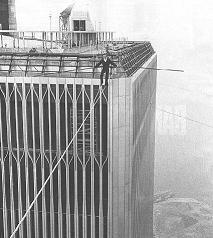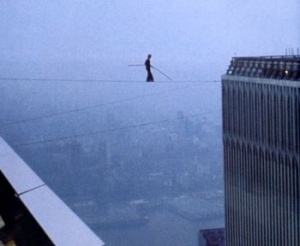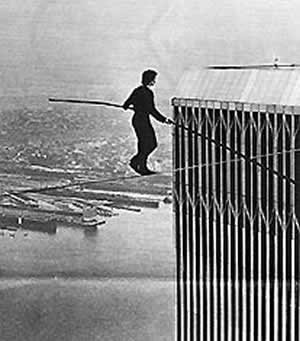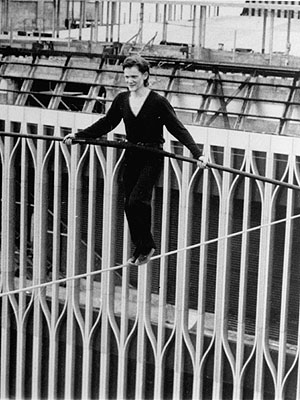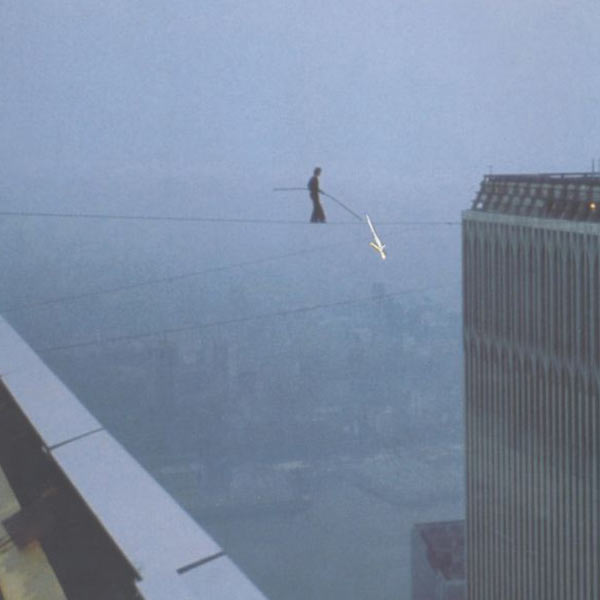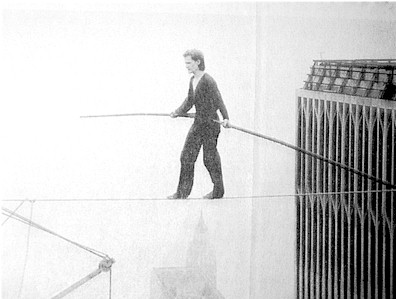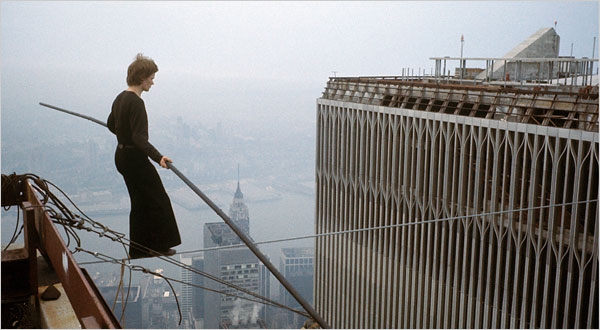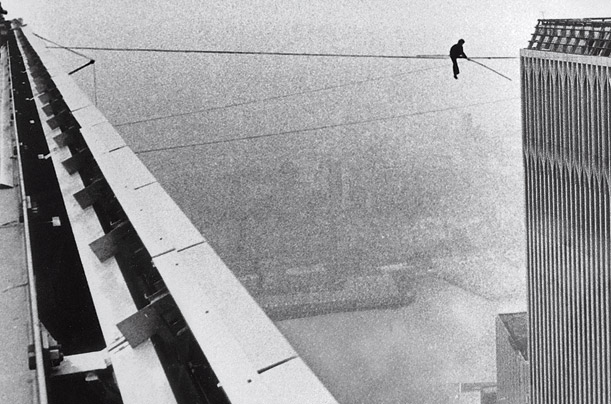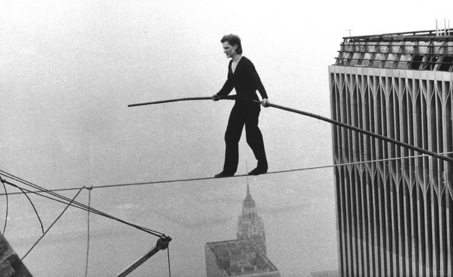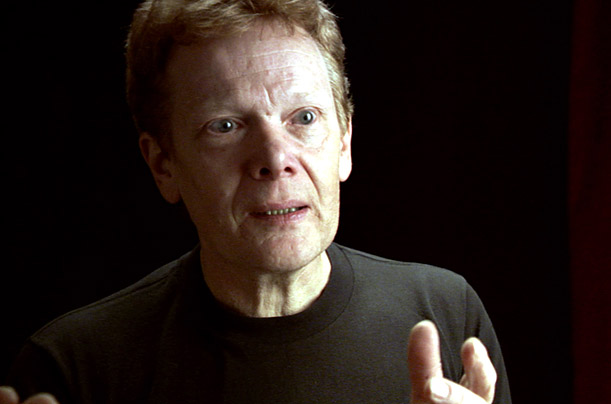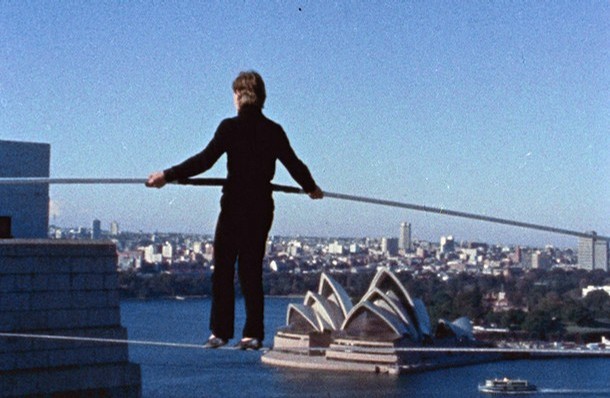Last week, I watched this documentary: "On August 7th 1974, a young Frenchman named Philippe Petit stepped out on a wire illegally rigged between New York’s twin towers, then the worlds tallest buildings. After nearly an hour dancing on the wire, he was arrested, taken for psychological evaluation, and brought to jail before he was finally released. Following six and a half years of dreaming of the towers, Petit spent eight months in New York City planning the execution of the coup. Aided by a team of friends and accomplices, Petit was faced with numerous extraordinary challenges: he had to find a way to bypass the WTCs security; smuggle the heavy steel cable and rigging equipment into the towers; pass the wire between the two rooftops; anchor the wire and tension it to withstand the winds and the swaying of the buildings. The rigging was done by night in complete secrecy. At 7:15 AM, Philippe took his first step on the high wire 1,350 feet above the sidewalks of Manhattan James Marshs documentary brings Petits extraordinary adventure to life through the testimony of Philippe himself, and some of the co-conspirators who helped him create the unique and magnificent spectacle that became known as the artistic crime of the century."
Last night, I dreamed I was called to a Beit Din. I was asked to explain myself.
"I report the news," I say. "Here I stand. I can do no other. So help me God."
That does not go over well.
And then it came to me in a flash — I am man on wire. The rabbis are the policemen. They’re waving me to come in. I dance along the wire and when they almost have me in their grasp, I dance away.
A crowd has gathered 1,350 feet below. The clouds are rolling in. The wire is getting slippery. The police have told my co-conspirators that they have called in a helicopter which will swoop me away unless I come in.
AdrianZ writes on imdb.com: "Constructed, believe it or not, as a heist film, composed of interviews, actual filmed footage from the seventies, re-enactments (done incredibly tastefully and intelligently) and a large number of photographs, "Man on Wire" from director James Marsh is a brilliant, audacious, stunning, and utterly enthralling film, and having seen it not more than an hour ago I can already say with confidence that it is one of the best documentaries ever made, not because it achieves the sort of brilliantly real observations on human behavior and emotions that a Maysles Bros. film does, but because it is a surprisingly hilarious, unbelievably well-crafted movie about so many absurdities, so much ridiculousness, such insane, insane acts (and yet so beautiful as well), and one which looks in on some of the most interesting people I think I’ve ever come across."
Lovely writes: "Viewing the movie as a character study of Mr. Petit offers another layer to film – this man, who seems wholly self-consumed and unaware of a) the potential problems of any such idea he stumbled upon and b) the emotional pressure he was putting on his friends who could have aided his death, speaks frankly even when discussing the aftermath of his stunt – which indirectly ended many of his friendships with people close to him."
Here are some of my favorite quotes from the film:
Philippe Petit: It’s impossible, that’s sure. So let’s start working.
Philippe Petit: If I die, what a beautiful death!
Philippe Petit: To me, it’s really so simple, that life should be lived on the edge. You have to exercise rebellion. To refuse to tape yourself to the rules, to refuse your own success, to refuse to repeat yourself, to see every day, every year, every idea as a true challenge. Then you will live your life on the tightrope.
Annie Allix: He courted me… and then my life was all about him. It was as if I had no destiny of my own… I was following his destiny.
Chris Knipp writes on imdb.com:
Philippe Petit is more than a little bit strange. And in some indefinable way he is also quintessentially French.. Not only has he an incredible insensitivity to danger (and drive to overcome it), but this diminutive, almost weightless fellow has his unmistakably Napoleonic side, his grandiosity. But also playfulness. One of the best moments is when he is being arrested and photographed (charge: trespassing; event description: "man on wire"), he takes a policeman’s uniform cap and balances it on his forehead by the bill, then flips it onto his head. His exploit had made him a celebrity and a mascot. He enhanced life, made a partly clunky new landmark beautiful and remarkable.
After the event, he knew he was famous. How can you ask me if I’m thirsty, he says to a psychiatrist, when 300 journalists are waiting to interview me? And his first act after release was, as somebody put it "to bang a groupie," which he himself describes as "disgusting." Maybe he was steadier out on the wire, where he remained for half an hour, high over New York, without a net, crossing and re-crossing eight times by his friend’s count. And then afterwards, somehow things were so bent out of shape that he ended two key relationships–with his girlfriend and his collaborator (both of whom help narrate this film).
This is troubling, but Petit is also wise, a saintly kind of man, immune to ordinary temptations (except groupies?). When asked why he’d done it, he said: "If I see three oranges, I have to juggle. And if I see two towers, I have to walk." The psychiatrist judged him "same and ebullient." His was a pure act, an existential declaration of joy, an example of how to live life daily to the fullest. "Every day for him was a work of art," says his girlfriend. "L’art pour l’art," art for art’s sake, is his motto.

On August 7, 1974, shortly after 7:15 a.m., Petit stepped off the South Tower and onto his 3/4" 6×19 IWRC steel cable. The 24-year-old Petit made eight crossings between the mostly-finished towers, a quarter mile above the sidewalks of Manhattan, in an event that lasted about 45 minutes. During that time, in addition to walking, he sat on the wire, gave knee salute and, while lying on the wire, dialogued with a gull circling above his head.
Port Authority Police Department Sgt. Charles Daniels, who was dispatched to the roof to bring Petit down, later reported his experience:
I observed the tightrope ‘dancer’—because you couldn’t call him a ‘walker’—approximately halfway between the two towers. And upon seeing us he started to smile and laugh and he started going into a dancing routine on the high wire….And when he got to the building we asked him to get off the high wire but instead he turned around and ran back out into the middle….He was bouncing up and down. His feet were actually leaving the wire and then he would resettle back on the wire again….Unbelievable really….[E]verybody was spellbound in the watching of it.[3]
Petit was warned by his friend on the South tower that a police helicopter would come to pick him off the wire. A rain had begun to fall and Petit decided he had tempted the gods long enough, so he decided to give himself up to the police waiting for him on the South tower. He was arrested once he stepped off the wire. The police – provoked by his taunting behaviour while on the wire – handcuffed him behind his back and roughly pushed him down a flight of stairs. This he later described as the most dangerous part of the stunt.[4]
His audacious high wire performance made headlines around the world. When asked why he did the stunt, Petit would say "When I see three oranges, I juggle; when I see two towers, I walk."

